Mulches typically serve two purposes in your garden. First, they retain moisture by creating a barrier between the soil and the air. Second, they suppress weeds. But how do you know what mulch to use where?
Mulches are a gardens best friend. They hold moisture, look good, reduce workload, and suppress weeds. Note that I mention suppress and not stop since mulches typically stop annual weeds from germinating. Tough perennial weeds and grasses that spread with underground rhizomes can usually penetrate mulches.
There are a few major types of mulches out there along with a few not-so-common types.
Cedar Mulch is probably the most economical mulch. It's essentially the shredded remains of cedar bark. It's economical since cedars are well-used in the lumber industry. You can also find cedar mulch that contains a dye to make it red, black, or even strange fluorescent colours. Cedar mulch has good lasting power in your garden, though yearly applications can also act to slowly acidify your garden. At some point you may need a bit of lime to counter that acidity.
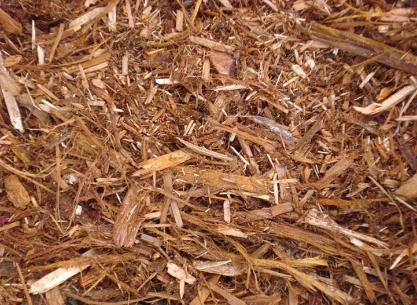
Pine Nuggets are the pine tree equivalent of cedar mulch. Pine trees develop a chunky scaly bark which is chipped off and processed into chunks of various sizes. It is more expensive, but it breaks down very slowly so it does last a very long time.
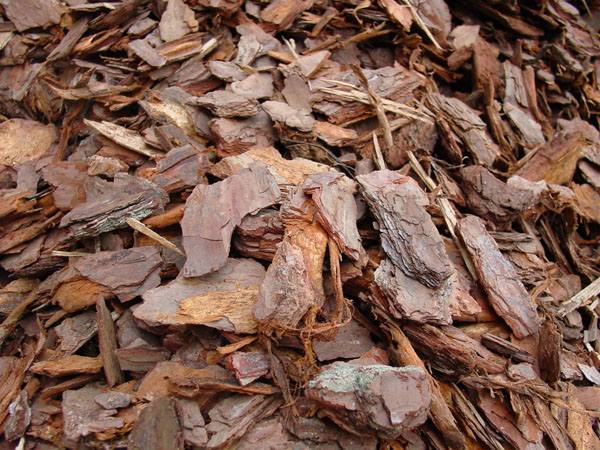
Cocoa Mulch comes from the shells of the cocoa bean during processing. It's a very fine reddish-brown colour that gives a chocolatey smell when spread. It breaks down quickly and doesn't alter the pH of the soil. However, it can develop mold in wet or damp areas, and had a toxic reaction if consumed by dogs (though most dogs don't try and eat it).
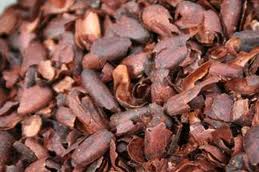
Stone Mulch can be any aggregate like pea-stone, river rock, crushed brick, white marble, and so on. Needless to say, it doesn't break down at all. Stone mulch can have a warming affect on the soil as well so keep it away from plants that like cool roots like clematis.
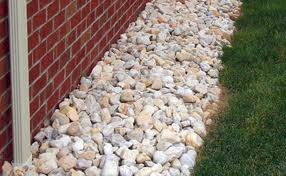
Composted Mulches are a collection of mulches developed to "feed" the garden. All mulch (except stone) do eventually feed the garden, but composted mulches are already partially broken down. Nincompoop is a good example since it's a composed horse manure type of mulch. For the first year it acts as a plain mulch and it gets worked into the ground like compost the following year.
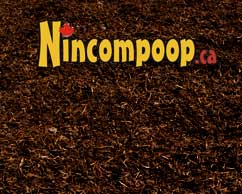
So, other than aesthetics, how do you select the right mulch? Let's break this down into uses.
Stone Mulches are best for permanent plantings where things aren't going to change much. They're also most appropriate were erosion can be an issue. Near driveways, walkways, downspouts, etc. Since they're permanent, I usually suggest adding landscape fabric underneath to really make it hard for those weeds.
Pine Nuggets take a long time to break down so they work well around the base of trees or in shrub gardens. Because of their slow breakdown, it's very hard to work the soil where you put pine nuggets.
Cedar mulches are good for perennial plantings. It lasts long enough to not break down after only one year (though an annual top-up is best) and it's thicker mat prevents weeds better. Composted mulches are also good for perennial gardens since they feed the garden well. It's also very economical for trees and shrubs, just lay it on thicker so you don't have to re-apply regularly.
Cocoa Mulch is the best for annual gardens. Since you're turning the soil over annually, you want something to break down relatively fast. It's also very light so it's much easier to spread between your annuals. Just watch those damp places since you will probably have mold (it's not necessarily bad mold, but it is still mold).
One other question I get often relates to freshly ground tree chippings or simply wood chips. Some people say it's dangerous for your garden, other people love it. Fresh tree chippings last a very long time in your garden, for one, so you have a very hard time re-planting. Also, during the break-down process, the mulch actually binds nutrients. This nutrient binding can actually starve your plants. Since tree chippings can take ten years or more to break-down, you do need to be careful and plan carefully. That's also why I don't suggest using straw between the rows in your vegetables - it will also bind the nutrients and starve your vegetables. Fresh mulch also has the potential to introduce pathogens into your garden. We do use fresh tree mulch often in very permanent plantings, but add extra food to compensate for the nutrient binding.

